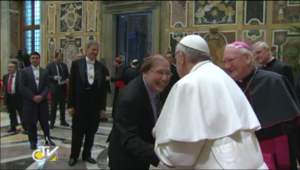By Rabbi Eric J. Greenberg

In early 2012, I received an unexpected phone call from a stranger – an American Jew living in Argentina.
He heard I am deeply involved in Catholic-Jewish relations and thought he had a great idea that I could help him with.
The former New Yorker had become friendly with Argentinian Rabbi Abraham Skorka, rector of the Seminario Rabinico Latinoamericano, and the rabbi of the Jewish community Benei Tikva. Rabbi Skorka had given him a copy of his book co-written with the Archbishop of Buenos Aires, Jorge Mario Bergoglio.
The book, published in 2010 and titled “Sobre el Cielo y la Tierra” (“Between Heaven and Earth”), presented a series of interreligious conversations between the rabbi and the cardinal, including such hot-button issues as fundamentalism, homosexuality, abortion and the Holocaust.
My caller was fascinated with this exchange, so much so that he volunteered to translate the book into English for wider distribution. He wanted my help in getting it published in the United States.
I received the translation, and found I could not put it down. It was indeed fascinating. Here was a rabbi and a Prince of the Church discussing these difficult topics in friendship. Even as they disagreed on some issues, there was great respect and an ease and grace rarely seen before. In a world where disagreements about religion too often leads to violence, I agreed that everyone should read this book, which could serve as a powerful model for interfaith understanding.
Not everyone at my office agreed, and I was instructed to shelve the idea. But somehow I knew this would be important, and I kept the translation in an envelope in a top drawer.
A year later, Pope Benedict XVI stunned the world by resigning, the first pope to do so in 600 years. The process began to elect a new pope. The “leading candidates,” according to the press, did not include a cardinal from Argentina.
Several weeks later, however, on March 13, 2013, the 76-year-old Buenos Aires cardinal became the first Latin American – and Jesuit – to be elected pontiff.
You might imagine my response. I immediately grabbed the translation, and quickly won approval to try and get the book published in the United States, which we did.
At the same time, I received another unexpected phone call. This time it was from a friend at the Vatican’s Pontifical Commission on Religious Relations with Jews. He was inviting me to attend the inauguration of the newly named Pope Francis the very next week, on March 19.
There could only be one answer.
In Rome, on a sunny and warm spring day, more than 200,000 people poured into and around St. Peter’s Square for this historic inauguration. The small Jewish delegation I was part of included rabbis and Jewish leaders from Italy, Argentina, Israel and the United States. We were ushered to plastic folding chairs in the first rows – symbolic of the positive new relationship between the Roman Catholic Church and its “beloved elder brothers and sisters” – using the words of Popes John Paul II and Benedict XVI.
Sitting on stage above us were such world leaders as Argentina’s President Cristina Fernandez and U.S. Vice President Joe Biden.
Following the two-hour ceremony, guests milled about behind the Basilica. I was able to connect with Catholic friends and colleagues including New York’s popular Cardinal Timothy M. Dolan and Boston’s Cardinal Sean O’Malley.
The next day, I was invited to attend Pope Francis’ first interreligious gathering as pope. It was a remarkable scene. Faith leaders from around the world, including Eastern Orthodox, Anglican, Muslim, Jewish, Zoroastrian, were escorted into a resplendent Vatican meeting room to hear and meet the new Pontiff.
At the front of the room, seated near Pope Francis, was Ecumenical Patriarch Bartholomew. It marked the first papal inauguration attended by the Patriarch of Constantinople in over 1,000 years.
Before I left Queens for Rome, I put a lot of thought into what I wanted to say to Pope Francis. I consulted with a good friend, who was born in Buenos Aires. I explained to him that I wanted to say something memorable – more than the typical formal greeting. Something fun, that a foreigner might say to a New Yorker upon meeting, such as “Let’s Go Mets, ” or Yankees – depending on what part of the Brooklyn Diocese one finds themselves in.
“This pope love soccer,” my friend responded. “And I know his favorite team.”
So when my friend Msgr. Brian Farrell, vice president of the Commission on Relations with Jews, introduced me to Pope Francis, I knew what to say.
As I finished my comments I concluded – “Viva San Lorenzo.” He looked stunned. Then he smiled, and began laughing. As did I. The other cardinals and religious leaders around us wondered why the pope and the rabbi were laughing.
With my mission accomplished, I headed back to my seat. But Francis suddenly took hold of my arm and tugged me back for a last word. “Thank you for supporting my team,” he smiled.
Now – our team.
Rabbi Eric J. Greenberg is director of Outreach, Interfaith and Communications for the Multifaith Alliance for Syrian Refugees. He is co-editor of “The Saint for Shalom: How Pope John Paul II Transformed Catholic-Jewish Relations.
